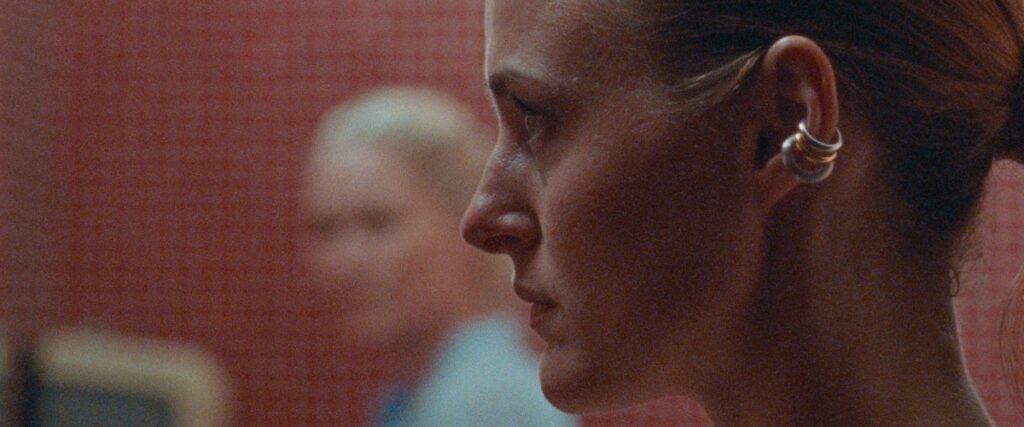
What could have been framed as a straight drama shows signs of something more surreal from the opening scenes of “Armand.” Why are the halls of this supposedly occupied school so gray and empty? Why do the fire alarms go off randomly? Does the administrator who keeps getting nosebleeds strike anyone else as odd? These are hints that Ingmar Bergman’s grandson, Halfdan Ullmann Tøndel, may be willing to crib from Grandpa’s “Persona” more than “The Teachers’ Lounge,” and it’s no spoiler to say that “Armand” does eventually collapse into surreal presentations of identity. The problem is that the final act of Tøndel’s film doesn’t feel like someone unpacking the ideas of the first two as much as realizing he has nowhere to take them. The always-engaging Renate Reinsve delivers yet again (as does talented co-star Ellen Dorrit Petersen). However, “Armand” is a frustrating, over-long movie that starts with an intriguing premise and then starts fighting it almost immediately.
Elizabeth (Reinsve) is a widowed mother who has been brought to her 6-year-old son Armand’s school after a report of an incident too horrible to explain over the phone. When she arrives, she’s greeted by a junior teacher named Sunna (Thea Lambrechts Vaulen), who is clearly about to get in over her head in a manner she doesn’t fully understand at first. Her superior advises her to handle the sensitive situation without any real concrete guidance, the first of many signs that this film is about people who reduce complex situations to talking points and how truth can shift in the wake of details. The administrators in “Armand” respond to every new piece of information as if it “explains it all”; there’s a sharp commentary buried here about the two-dimensional manner in which powerful people, especially men, handle three-dimensional situations.
Elizabeth learns about the situation when his classmate Jon’s parents show up. Elizabeth knows Sarah (Petersen) and Anders (Endre Hellestveit) well—Jon has even been at her house so Elizabeth could watch him after school. Jon has a horrifying story about Armand, one involving abuse and at least the threat of sexual violence. From the beginning, the story doesn’t make sense: not only is Armand not that kind of child, where would he even learn the meaning of the word “anal”? She’s understandably startled that everyone seems to believe Jon without hearing what Armand has to say, and it’s not accidental that she’s outnumbered on the other side of the room, as if the school is taking dual parents more seriously than the single one. Reinsve is excellent in these early scenes, taking in the information and confronting both what she’s being told and who’s telling it. She is a superb actress at conveying thought instead of merely reciting lines.
The problem is that Tøndel’s approach smothers Reinsve (and Petersen’s equally nuanced turn) before they can really get going. As the initial meetings break up, the characters basically walk the halls while Tøndel drops morsels of backstory meant to shift allegiance and raise suspicion. Was Armand crying out for help? Was his recently deceased father abusive enough to give a child the vocabulary of an adult? Did Dad even really die in an accident? The initial incident becomes clouded in suspicions and excuses, which could make for an interesting character drama if Tøndel wasn’t intent on careening into surrealism.
There needs to be more relatable humanity at the core of “Armand” than Tøndel seems interested in providing. A scene in which Elizabeth can’t control her laughter feels nearly interminable, unbelievable, and intentionally abrasive to the audience. It seems to be insisting that her predicament has become so outlandish that all she can do is laugh to keep herself from crying. Still, it calls so much attention to itself in terms of its filmmaking—in that characters don’t respond to an epic laughing fit like anyone in the real world—that it punctures any emotional attachment to Elizabeth, Sarah, or even the unseen Armand. And Tøndel never quite recovers.
“Armand” gets even stranger from there, like when Elizabeth pauses to do what looks like an interpretative dance with a janitor in the darkly lit hallway or has a strange encounter with Anders in an empty classroom. There’s nothing wrong with starting with a grounded premise and then pivoting to surrealism to reveal greater truths. But the film obfuscates more than it uncovers.
We don’t know what exists behind the closed doors of our friends and neighbors, even the ones who occasionally watch our children. And when those dark things we don’t understand emerge into the light, we are remarkably incapable of handling them sensitively. It’s an ambitious theme for a writer/director to unpack in their debut, and it gets away from Tøndel. He seems to have made a film more interested in his grandfather’s legacy than any of its characters.
In limited release today, wider on February 14.



